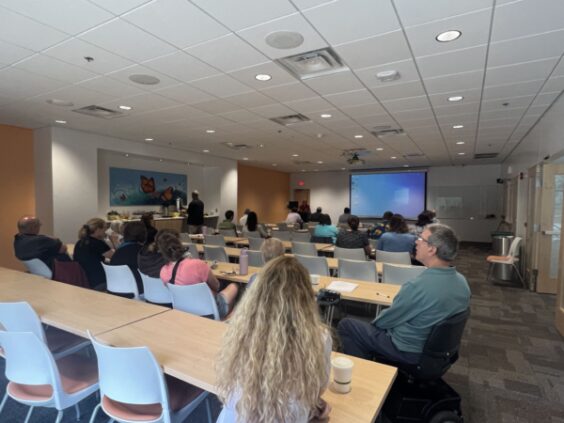Uniting the FSHD Community in Advancing Research
by Nizar Saad, PhD, Columbus, Ohio
 On July 8th, our lab at Nationwide Children’s Hospital (NCH) in Columbus, Ohio, in collaboration with NCH, the FSHD Society, and the Society’s Columbus chapter led by Susan Aumiller, orchestrated a highly successful “FSHD Lab Day.” During this event, members of the FSHD community congregated at the hospital to actively participate in the ongoing research endeavors led by our lab.
On July 8th, our lab at Nationwide Children’s Hospital (NCH) in Columbus, Ohio, in collaboration with NCH, the FSHD Society, and the Society’s Columbus chapter led by Susan Aumiller, orchestrated a highly successful “FSHD Lab Day.” During this event, members of the FSHD community congregated at the hospital to actively participate in the ongoing research endeavors led by our lab.
The core objective of the FSHD Lab Day was to address our lab’s imperative need for blood samples from both FSHD-affected and unaffected people. Our research aims to uncover novel molecular biomarkers circulating in patients’ blood. Such biomarkers, if we can find them, hold the potential to serve as diagnostic tools, facilitate the tracking of FSHD progression in patients, and serve as indicators of the efficacy of therapeutic interventions during a clinical trial.
The resounding enthusiasm and active involvement of the FSHD Society and the FSHD community in Columbus, Ohio, underscored their commitment to this event. This collaborative initiative provided a platform for the community to engage with researchers and actively participate in their ongoing scientific investigations.
Attendance at the event was robust, attracting FSHD individuals, their families, and friends. The day began with informative sessions led by Kevin Flanigan, MD, and Scott Harper, PhD, both esteemed experts in neuromuscular diseases. Dr. Flanigan eloquently emphasized the critical importance of the FSHD community’s engagement in clinical studies, offering insights into the extensive research activities underway at the Center for Gene Therapy at NCH. Dr. Harper provided a comprehensive update on his pioneering gene therapy approach tailored to address FSHD, while I offered an in-depth exploration of the significance of my ongoing study.
Speeding up research by one year!
The event saw a good turnout. By providing blood samples in one day, the participants literally sped up the clock on research. Otherwise, our lab would have had to wait for people to come in one by one to a doctor’s appointment. It might have taken us at least a year to collect the same number of samples. What’s more, those unable to attend in person expressed unwavering determination to contribute blood samples at a later time.
Infused with a welcoming and congenial atmosphere, the FSHD Lab Day provided an ideal platform for meaningful exchanges between the FSHD community and researchers. Beyond the scientific discourse, participants enjoyed a communal lunch, watched Red Scooter Diaries, a film made by a woman with FSHD, and engaged in broader discussions on various subjects.
Patients were happy to be directly involved in research and had a sense of contributing collectively to something meaningful that will accelerate the validation of therapies for FSHD. And our lab is deeply grateful to them for their time and deep engagement with our work.


I live in Indonesia. How can I support/ contribute to the research?
There must be thousands of people with FSHD living in Indonesia. Would you like to help build a patient support group there? If you can find a researcher who’s interested, you could help create a patient registry, start to collect data, and also educate patients and families so they have information to manage their symptoms, and most importantly, so they aren’t alone in their struggles. We can show you how to do these things and support your efforts in various ways.